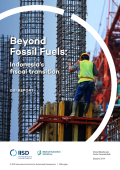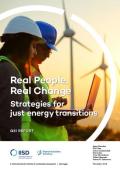
This publication, Beyond Fossil Fuels: Indonesia's fiscal transition, makes a first attempt at an integrated analysis of how Indonesia both taxes and subsidizes production and consumption of oil, gas, coal, and electricity (most of which is generated with coal). The paper also explores lessons learned from Indonesia’s reduction of fiscal dependence on fossil fuels.

This study provides a clear picture of the state of G20 transport emissions, analyses already existing approaches for decarbonising the transport sector and stresses the urgency of putting ambitious climate action on the political agenda. It includes factsheets on each G20 member that shed light on the specific situation and challenges in each country, including existing goals and efforts. The report concludes by comparing stated ambition with implemented policies and actions while also considering required global reductions in the transport sector to keep the global temperature rise well below 2 degrees Celsius.

This report provides investment potential estimates across six key sectors (waste, renewable energy, public transportation, water, electric vehicles, and green buildings). Sector-specific investment potentials are estimated at the global and regional levels. The report also addresses urban resilience, financing solutions, and includes six deep dives into specific cities – one from each region – representing various sizes and stages of development:

This report aims to support governments of developed and developing countries in their endeavour to make energy transitions just. It brings together political and communications strategies for a just transition, building on research and case studies of energy transitions that have happened or that are happening in Canada, Egypt, Indonesia, India, Poland and Ukraine.
Through the joint research, Korea and Indonesia mutually examined, compared, and understood how the collaboration on the conservation of the natural environment has been implemented.
